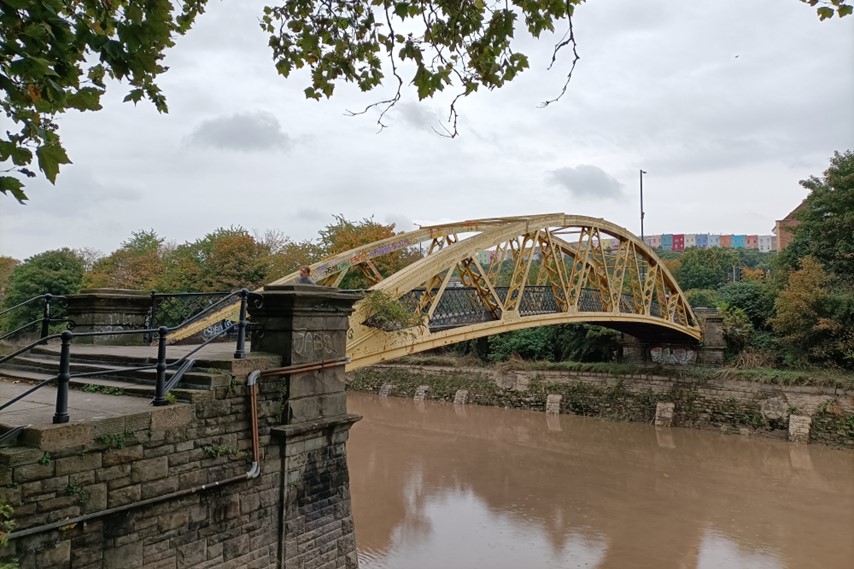1 July 2024
Partial closure of York Road for emergency works to New Cut river wall
As part of Bristol City Council’s ongoing multi-million pound programme to stabilise the most at-risk river walls along the New Cut of the River Avon, emergency work will start on Monday 8 July either side of Langton Street Bridge, also known as Banana Bridge.
Electronic sensors are showing that movement of a 120 metre stretch of masonry wall near Langton Street Bridge is speeding up, and the river wall could fail if urgent action is not taken.
The council has programmed in emergency repairs to the wall on the York Road side of the New Cut, either side of Langton Street Bridge, which is currently closed for repair work as part of the council’s programme to restore six bridges across the New Cut.
These emergency works are expected to take around twelve weeks and include placing one-tonne bags along the bank of the river to reduce the tidal pressure on the wall. This will help to secure the river wall until long-term works are carried out.
Due to the size of the lifting equipment needed to carry out the emergency works, part of York Road will need to close for up to twelve weeks from Monday 8 July.
To maintain as much access as possible, the work will be carried out in two phases.
Further design work is needed to ensure the required actions to repair the river wall do not affect utilities in and around the site. To ensure work carries on with urgency, while allowing for further work with utility companies to protect vital infrastructure, the two phases of work will switch.
Phase one will now see York Road closed between St Luke’s Road and Spring Street for six weeks.
Phase two will now see York Road closed between St Luke’s Road towards Bath Bridges roundabout for six weeks.
The diversionary routes will be signposted, but the council is asking people to consider their journeys through this area and to make decisions further ahead and avoid the surrounding streets.
Access for York Road residents will be maintained at all times and the closure will not impact the businesses near to the Bath Bridge roundabout. Access for pedestrians and cyclists will also be maintained.
To gain access to the embankment for the emergency repairs, unfortunately four London planes trees will need to be felled or pruned back under the guidance of ecologists. Any trees lost will be replaced with new trees as part of the long-term permanent repairs.
Councillor Ed Plowden, Chair of the Transport and Connectivity Committee, said: “These works are vital to stabilise the river wall. If left any longer, there is a risk that this section could fail, leading to severe consequences. We’ve already seen a very serious collapse like this on Cumberland Rd, which increased the remediation costs and the time needed to complete repairs.
“Safety must come first, but, while I’m pleased the emergency repairs will be starting soon, the temporary closure of part of York Road will undoubtedly cause disruption in the area and it’s always a last resort to remove any trees. I have asked the team to make every effort to work around the valuable street trees.
“I would like to thank everyone ahead of time for their understanding while we carry out these important works to safeguard the future of Bristol’s harbourside assets.”
The long-term, permanent repairs are estimated to take up to two years to complete, and include:
- installing a sheet-piled retaining wall at the top of the bank to stabilise York Road
- building a concrete piled wall behind the existing river wall
- planting trees and vegetation along the 120 metre section of stabilised embankment
Griffiths, the council’s contractor, will carry out the works.
To keep up to date with the programme, please visit www.bristol.gov.uk/newcutriverwalls.
Updated 4 July 2024.
